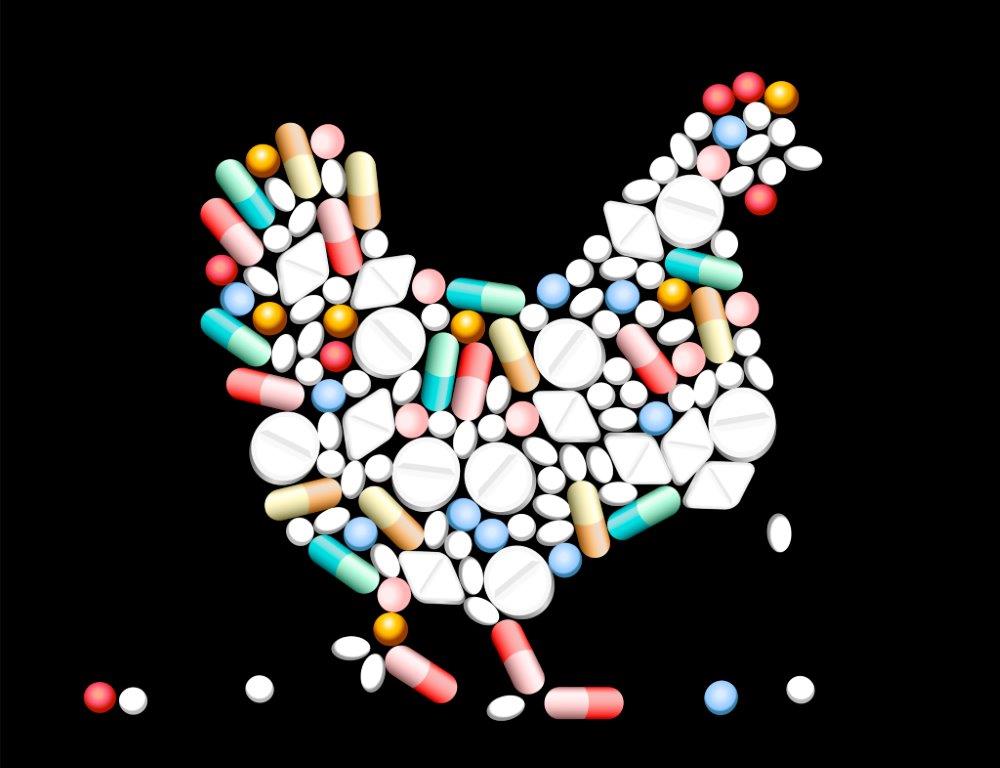Indian Poultry Sector and Antibiotics
As the Coronavirus crisis has unfolded over the past few months, we have witnessed a lot of the blame being appropriated to wet markets in China along with the notion being spread that frozen meat stored in Big Supermarkets is completely safe from all kinds of contamination. With this piece, I try to debunk some of these notions.
The Indian media has been quick to blame the state of Chinese wet markets without realizing that disease outbreaks are not limited to the distribution of meat but also extends to the rearing poultry. This is an issue that India has been facing for a long time with the unhygienic rearing of poultry leading to health concerns. It is, however, egg production, that has come under much criticism. Despite India being one of the three largest egg producers in the world, with 47 billion eggs produced per year, they do not meet international standards, and Indian eggs are rejected for export due to the presence of chemicals in and outside the shells.
The ramifications of the poor management of the sector are evident by the outbreak of avian borne diseases such as the Nipah virus in 2001, the H5N1 outbreaks in 2003 and 2006, the Swine Flu outbreak in 2016, and Salmonellosis in 2013 among many other cases of avian influenza being spread.
Considering the lamentable hygiene practices in the poultry industry, India has the potential to be the birthplace of superbugs as it fosters the largest antibody resistant population in the world. There seem to be two primary reasons for this, indiscriminate consumption of unprescribed antibiotics and the use of antibiotics to fuel the growth of the poultry industry in order to meet the ever growing demand for protein. This has led to the rise of diseases that are resistant to traditional antibiotics and threatens to render the miracle of modern medical science ineffective. According to Professor Ramanan Laxminarayan, Director of the Centre for Disease Dynamics, Economics and Policy, based in Delhi; a large number of Indian poultry farmers are reliant on heavy doses of antibiotics to secure the health of the animals while compromising upon maintaining hygiene and providing healthy feed to the animals. A prime reason for this is the cheap cost and prescription-free availability of antibiotics in India. What is extremely frightening about all of this, is that a lot of unaware farmers are duped into using antibiotics as ‘growth supplements’ for prophylactic purposes.
The central government has shown some initiative in combating Anti Microbial Resistance (AMR) as in July 2019, it banned who have little other medication left to them. This is an extremely positive step as the banning of such antibiotics along with state wise antibiotic stewardship policies and guidelines. However, detailed monitoring of the supply chain of these antibiotics is still required. Furthermore, due to the role of cross contamination in disease outbreaks it is evident that we will not be able to achieve much without an effective nationwide sanitation program that promotes good hygiene practices. A combined effort from the government, public and medical community is essential to move India into the future.
As far as the distribution part of the poultry supply chain is concerned, the problem is accentuated in India particularly when we consider the condition of butcheries and meat shops across the country. There have been limited efforts by the FSSAI to ensure that all butcheries/meat shops and meat wet markets in India are regulated and graded on the basis of hygiene ratings in order to satisfy hygiene standards.
The FSSAI, triggered by the Coronavirus outbreak, has decided to take a step in this direction and will be initiating hygiene-rating certifications for meat and fish shops in collaboration with state governments. As of now, the FSSAI is considering third party audits of municipal slaughterhouses for private fish and meats shops and slaughterhouses (among other high-risk food categories). However, this seems like a tough proposition at best considering the difficulty in maintaining oversight over a huge market with unhygienic practices from the rearing, transportation of live animals to their ultimate sale in local markets.
The FSSAI has initiated hygiene-rating certification for meat and fish shops in collaboration with the State governments with the hope that hygiene rating scheme will be adopted by all meat and fish product shops in the next one year. However, that is not a measure that can work unless the customers are sensitized enough to put pressure on informal meat shops and butchers; the initiation of which has to come from the government as unless the customer feels that the hygiene certification is a thing to look for, its introduction may not have the ideal impact.




Comments